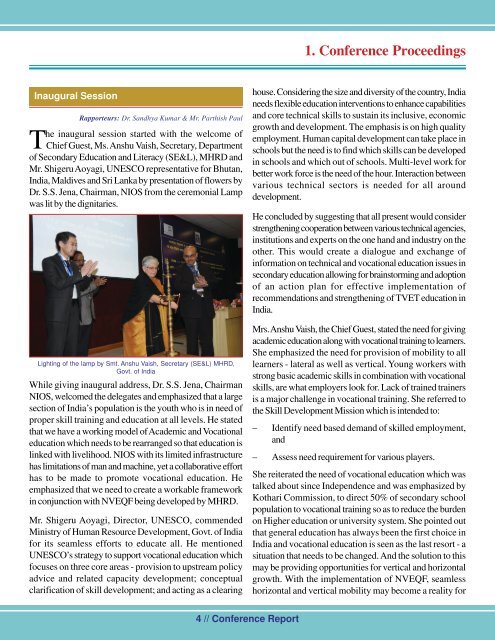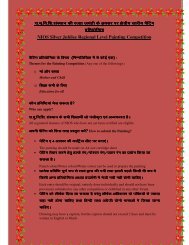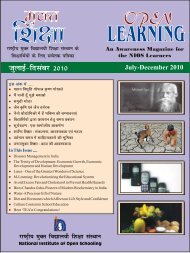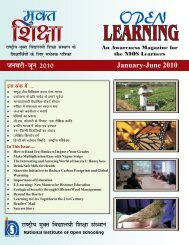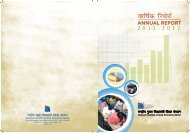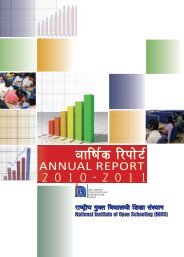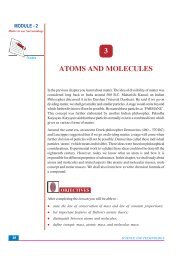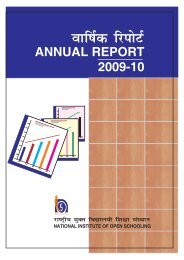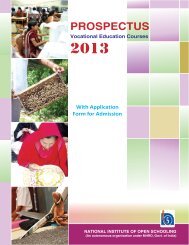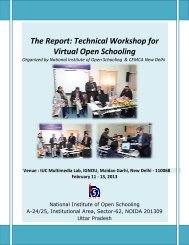Conference Report - The National Institute of Open Schooling
Conference Report - The National Institute of Open Schooling
Conference Report - The National Institute of Open Schooling
Create successful ePaper yourself
Turn your PDF publications into a flip-book with our unique Google optimized e-Paper software.
1. <strong>Conference</strong> Proceedings<br />
Inaugural Session<br />
Rapporteurs: Dr. Sandhya Kumar & Mr. Parthish Paul<br />
<strong>The</strong> inaugural session started with the welcome <strong>of</strong><br />
Chief Guest, Ms. Anshu Vaish, Secretary, Department<br />
<strong>of</strong> Secondary Education and Literacy (SE&L), MHRD and<br />
Mr. Shigeru Aoyagi, UNESCO representative for Bhutan,<br />
India, Maldives and Sri Lanka by presentation <strong>of</strong> flowers by<br />
Dr. S.S. Jena, Chairman, NIOS from the ceremonial Lamp<br />
was lit by the dignitaries.<br />
Lighting <strong>of</strong> the lamp by Smt. Anshu Vaish, Secretary (SE&L) MHRD,<br />
Govt. <strong>of</strong> India<br />
While giving inaugural address, Dr. S.S. Jena, Chairman<br />
NIOS, welcomed the delegates and emphasized that a large<br />
section <strong>of</strong> India’s population is the youth who is in need <strong>of</strong><br />
proper skill training and education at all levels. He stated<br />
that we have a working model <strong>of</strong> Academic and Vocational<br />
education which needs to be rearranged so that education is<br />
linked with livelihood. NIOS with its limited infrastructure<br />
has limitations <strong>of</strong> man and machine, yet a collaborative effort<br />
has to be made to promote vocational education. He<br />
emphasized that we need to create a workable framework<br />
in conjunction with NVEQF being developed by MHRD.<br />
Mr. Shigeru Aoyagi, Director, UNESCO, commended<br />
Ministry <strong>of</strong> Human Resource Development, Govt. <strong>of</strong> India<br />
for its seamless efforts to educate all. He mentioned<br />
UNESCO’s strategy to support vocational education which<br />
focuses on three core areas - provision to upstream policy<br />
advice and related capacity development; conceptual<br />
clarification <strong>of</strong> skill development; and acting as a clearing<br />
house. Considering the size and diversity <strong>of</strong> the country, India<br />
needs flexible education interventions to enhance capabilities<br />
and core technical skills to sustain its inclusive, economic<br />
growth and development. <strong>The</strong> emphasis is on high quality<br />
employment. Human capital development can take place in<br />
schools but the need is to find which skills can be developed<br />
in schools and which out <strong>of</strong> schools. Multi-level work for<br />
better work force is the need <strong>of</strong> the hour. Interaction between<br />
various technical sectors is needed for all around<br />
development.<br />
He concluded by suggesting that all present would consider<br />
strengthening cooperation between various technical agencies,<br />
institutions and experts on the one hand and industry on the<br />
other. This would create a dialogue and exchange <strong>of</strong><br />
information on technical and vocational education issues in<br />
secondary education allowing for brainstorming and adoption<br />
<strong>of</strong> an action plan for effective implementation <strong>of</strong><br />
recommendations and strengthening <strong>of</strong> TVET education in<br />
India.<br />
Mrs. Anshu Vaish, the Chief Guest, stated the need for giving<br />
academic education along with vocational training to learners.<br />
She emphasized the need for provision <strong>of</strong> mobility to all<br />
learners - lateral as well as vertical. Young workers with<br />
strong basic academic skills in combination with vocational<br />
skills, are what employers look for. Lack <strong>of</strong> trained trainers<br />
is a major challenge in vocational training. She referred to<br />
the Skill Development Mission which is intended to:<br />
– Identify need based demand <strong>of</strong> skilled employment,<br />
and<br />
– Assess need requirement for various players.<br />
She reiterated the need <strong>of</strong> vocational education which was<br />
talked about since Independence and was emphasized by<br />
Kothari Commission, to direct 50% <strong>of</strong> secondary school<br />
population to vocational training so as to reduce the burden<br />
on Higher education or university system. She pointed out<br />
that general education has always been the first choice in<br />
India and vocational education is seen as the last resort - a<br />
situation that needs to be changed. And the solution to this<br />
may be providing opportunities for vertical and horizontal<br />
growth. With the implementation <strong>of</strong> NVEQF, seamless<br />
horizontal and vertical mobility may become a reality for<br />
4 // <strong>Conference</strong> <strong>Report</strong>


